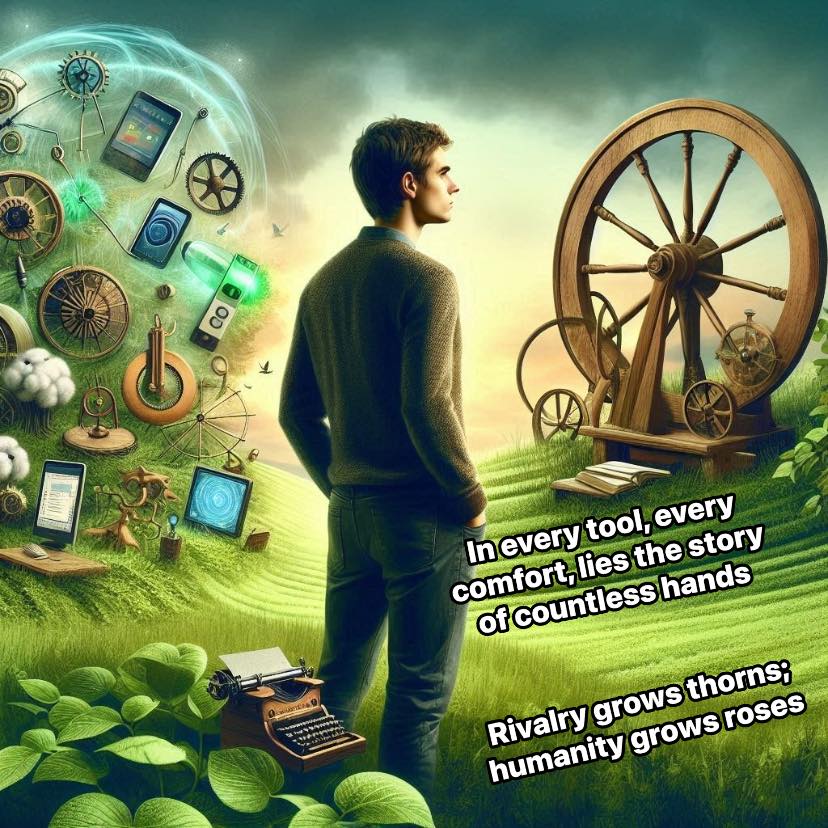
In a quiet village bordered by rolling meadows, there lived a wise gardener named Anara. Her garden was renowned far and wide, bursting with vibrant colors and heady fragrances. People often visited, marveling at the blooms and the serenity they evoked. But Anara wasn’t just a gardener of flowers—she was a cultivator of wisdom.
One day, a young man named Kavi visited Anara. His eyes were fiery, his words sharp. “I don’t trust people,” he declared. “Everyone’s competing, everyone’s taking what should be mine. Life is a battlefield.”
Anara listened patiently. Then she handed Kavi a small seed. “Plant this in your garden,” she said, “and care for it. In time, it will show you something important.”
Curious but skeptical, Kavi took the seed and planted it. Days turned into weeks, and the seed sprouted into a thorny bush. Kavi tended to it diligently, though he often pricked his fingers on its sharp edges. The plant grew, but no flowers bloomed—only more thorns.
Frustrated, Kavi returned to Anara. “What’s the point of this?” he demanded. “It’s a worthless plant. No beauty, no use—just pain!”
Anara smiled. “Ah, but isn’t that the nature of rivalry and war? A thorn tree will never yield flowers. One who expects roses from thorns is living in a fool’s paradise. Conflict and envy only breed more of the same.” Kavi fell silent. The truth in her words unsettled him.
Anara led him to her own garden and pointed to a flourishing rose bush. “Do you see this?” she asked. “This beauty exists because humanity, over centuries, has learned to cultivate the wild and tame the hostile. Every tool I use, every piece of knowledge I apply, is not mine alone. It’s a gift from countless generations who worked not to fight, but to build.”
She continued, “Look around you, Kavi. The roads you walk on, the clothes you wear, the food you eat—none of these are your own creation. They are humanity’s collective gift to you. If you understood this, you would love humanity more than you love your parents. You’d see others not as rivals, but as benefactors.”
Kavi’s gaze wandered to the tools in her shed and the water flowing from her fountain. He realized that every comfort he took for granted had a history, born from the toil and ingenuity of countless unseen hands.
“But how can I succeed,” he asked, “if I don’t fight for what’s mine?”
Anara chuckled softly. “Success isn’t about taking from others. It’s about improving the human condition. Plan your time and energy wisely, use the opportunities within your reach, and never make others suffer by your hands. In that, you’ll find not just success, but peace.”
Kavi returned to his thorn bush with a newfound perspective. He planted other seeds alongside it—seeds of flowers, fruits, and vegetables. Over time, his garden transformed, becoming a tapestry of life and color. Visitors came to admire it, and Kavi shared his story with them.
Years later, when people asked Kavi how his garden flourished, he would say, “I stopped tending to thorns alone. I started cultivating humanity’s gifts instead.”
And so, his village became a living testament to the wisdom of Anara—the idea that life’s true beauty lies not in rivalry, but in the shared contributions of all.
This tale reminds us that rivalry, like a thorn tree, can only grow thorns. But by recognizing and nurturing the gifts of humanity, we can cultivate a garden of harmony and progress.

